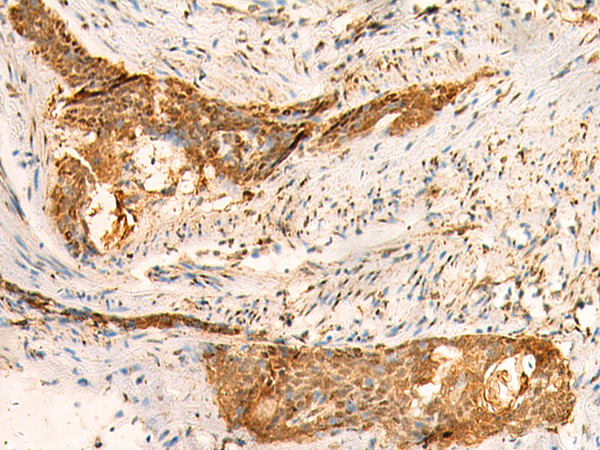
| WB | 咨询技术 | Human,Mouse,Rat |
| IF | 咨询技术 | Human,Mouse,Rat |
| IHC | 1/50-1/300 | Human,Mouse,Rat |
| ICC | 技术咨询 | Human,Mouse,Rat |
| FCM | 咨询技术 | Human,Mouse,Rat |
| Elisa | 1/5000-1/10000 | Human,Mouse,Rat |
| Aliases | FDG; UNG3; HMUDG |
| Host/Isotype | Rabbit IgG |
| Antibody Type | Primary antibody |
| Storage | Store at 4°C short term. Aliquot and store at -20°C long term. Avoid freeze/thaw cycles. |
| Species Reactivity | Human, Mouse, Rat |
| Immunogen | Fusion protein of human SMUG1 |
| Formulation | Purified antibody in PBS with 0.05% sodium azide and 50% glycerol. |
+ +
以下是3篇关于SMUG1抗体的参考文献及简要摘要:
1. **"Characterization of SMUG1 as a key enzyme in DNA repair"**
- **作者**: Kavli B, et al.
- **摘要**: 本文通过免疫印迹和免疫荧光技术验证了SMUG1抗体的特异性,证明SMUG1在碱基切除修复(BER)中对尿嘧啶损伤的修复具有独特活性,与其他糖基化酶(如UNG)功能互补。
2. **"SMUG1 expression correlates with cancer prognosis and chemotherapy response"**
- **作者**: Almeida KH, et al.
- **摘要**: 研究利用SMUG1抗体分析多种肿瘤样本,发现SMUG1低表达与结直肠癌患者预后不良相关,提示其在DNA损伤应答和化疗敏感性中的潜在作用。
3. **"Structural and functional analysis of SMUG1-DNA interactions"**
- **作者**: Masaoka A, et al.
- **摘要**: 通过抗体介导的蛋白质纯化结合晶体学研究,揭示了SMUG1识别单链DNA中尿嘧啶的结构机制,并发现其催化活性依赖于保守的氨基酸残基。
*注:若需更近期文献(如2020年后),建议在PubMed或Web of Science检索关键词“SMUG1 antibody application”或“SMUG1 immunohistochemistry”。*
SMUG1 (Single-strand-selective Monofunctional Uracil-DNA Glycosylase 1) is a DNA repair enzyme belonging to the uracil-DNA glycosylase family. It primarily excises uracil residues from DNA formed through spontaneous deamination of cytosine or misincorporation during replication, playing a critical role in base excision repair (BER) pathways. Unlike other glycosylases, SMUG1 exhibits a preference for single-stranded DNA and is implicated in both nuclear and mitochondrial genome maintenance. Its activity is linked to genomic stability, aging, and cancer development, with dysregulation observed in various malignancies and neurodegenerative disorders.
SMUG1 antibodies are immunological tools developed to detect, quantify, and study the spatial-temporal expression of SMUG1 proteins in cells and tissues. These antibodies are widely utilized in techniques such as Western blotting, immunohistochemistry, immunofluorescence, and flow cytometry. High-quality SMUG1 antibodies are validated for specificity using knockout cell lines or siRNA knockdown controls to minimize cross-reactivity with related glycosylases like UNG or TDG. Researchers employ them to investigate SMUG1's role in DNA damage responses, its interaction with repair pathway components, and its potential as a biomarker in cancer prognosis or therapeutic targeting. Commercial SMUG1 antibodies are typically raised in rabbits or mice, with recombinant proteins or peptide fragments serving as immunogens. Their applications span basic research in DNA repair mechanisms, clinical studies exploring SMUG1 expression patterns in tumors, and pharmacological screens for BER pathway modulators.
×